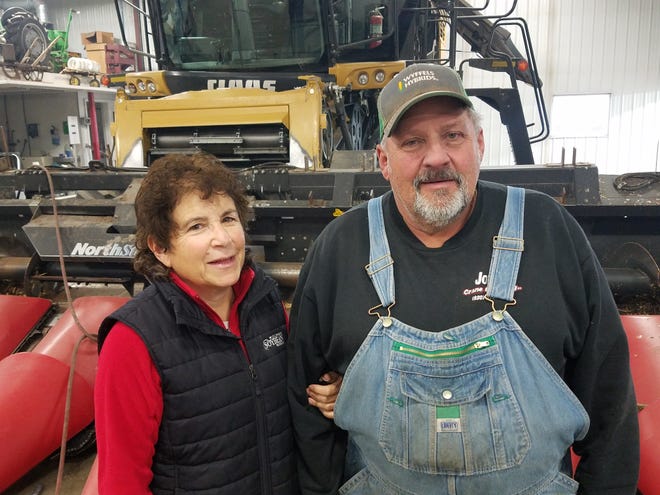Beaver Dam couple stays in touch with the soil

BEAVER DAM – The Thanksgiving dinner table conversation among siblings who grew up in the urbanized Long Island, New York area is not likely to be about farming and phosphorus management but that’s just the kind of conversation Nancy Kavazanjian and her brother, a scientist and researcher at the Arizona State University had nearly three years ago.
Kavazanjian farms nearly 2000 acres in Dodge County with her husband, Charlie Hammer, and both have always been interested in conservation and protecting the environment while still getting good grain production on their land.
In fact, since they started farming together back in the 1980’s their farm motto has been "Our Soil, Our Strength". Their motto is painted on their farm trucks and signs and for years they have lived up to it by trying different ways to successfully increase their soil organic matter, fertility, and tilth.
They are always willing to try new and progressive farming techniques for conservation which improves the soil health and in turn crop yields.
Kavazanjian credits their crop consultant Bill Stengel for challenging them and helping them come up with new ideas.
“Every time we try something new and it is working he will say, ‘what more can we do?’" she says.
Their efforts have recently led to their nomination for the Wisconsin Leopold Conservation Award. Given in honor of renowned conservationist Aldo Leopold, the prestigious award recognizes farmers and foresters who inspire others with their dedication to land, water and wildlife habitat in their care.
Charlie and Nancy have practiced no-till since 1985 with a corn-soybean-wheat rotation. They have also been experimenting with cover crops such as alfalfa, red clover and hairy vetch following wheat to secure nitrogen and provide soil protection and enhancement. Other innovative techniques they use include precision agriculture that consists of grid soil sampling, yield monitoring with GPS, and also GPS to control wheel traffic to reduce compaction. Tractors, combine and grain cart are also equipped with tracks to minimize compaction.
The couple has been working with the Dodge County Healthy Soils Healthy Waters group that is made up of farmers willing to try some new conservation practices. The group also gets support from local lakes associations interested in helping farmers prevent runoff of nutrients into their lakes.

Their latest project, the one discussed at their Thanksgiving dinner table, is on a farm they operate on the edge of Fox Lake. With help from two Fox Lake organizations and the soybean association they have installed a system being developed by Kavazanjian’s brother and others at Arizona State University. The innovative Phosphorus Reduction System will use several water flow control devices and blast furnace slag to reduce the concentration of Phosphorus in the water within their drain tile line that all eventually goes into Fox Lake.
Getting the system up and running took more time than they anticipated. The extreme wet soil and abundance of rain in the fall of 2019 delayed construction. Then this spring the filter bed didn’t work because the filtering material was too fine and it plugged. Revamping experienced delays partly because of slow downs due to COVID-19 that led to delays in getting supplies and the offices of advisors and consultants working on the project were closed for a time.
They are now monitoring the rebuilt filter bed and regularly scheduled sampling of the drain tile water to be tested in a lab to measure its effectiveness. Should the project prove to be successful, it could be replicated to reduce Phosphorus outputs on other farms that use drain tile.
Besides their conservation efforts Hammer and Kavazanjian have made a huge effort to provide the needed habitat for pollinators by providing land for a pollinator strip of native wildflowers and milkweed that was planted by students at nearby Beaver Dam High School. They located the patch near their farm’s solar energy panels that generate the farm’s electricity and the windmill they built a few years ago.
The couple has also planted trees on some of the odd-shaped pieces of their land as a part of the Conservation Reserve Program.
Each year the Beaver Dam area farmers picks out a couple of acres of land for planting sweet corn. They enlist help from FFA students and others to pick it and deliver it to area food pantries. They have also expanded that effort by delivering truckloads of sweet corn down to the inner city of Milwaukee and this year, seeing the need of the people there, they enlisted help from others to get donations of pumpkins and potatoes from Alsum Produce as well as other farm fresh foods and clothing.
The couple has earned numerous awards over the years for their conservation efforts. While they say it is nice to be nominated or chosen for awards their real reward has come from seeing the continued improvements in their soil health and the yields of their crops that have flourished as a result.
Hammer grew up on the farm where he now he keeps busy maintaining equipment and learning new ideas. He’s proud of his farming heritage and wants to see it continue.
He has no plans to work more land because he enjoys actually getting out into the field to drive the combine, spray or perform needed tasks. While he is grateful for employees, he wants to stay directly involved himself as well.